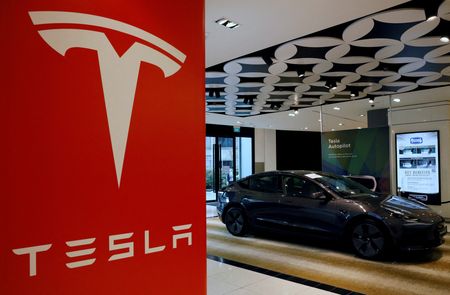By Hyunjoo Jin and Akash Sriram
(Reuters) – Tesla Inc said on Wednesday it expected to miss its vehicle delivery target this year, but downplayed concerns about softening demand after its revenue missed Wall Street estimates.
Chief Executive Elon Musk told analysts on a conference call there was excellent demand in the fourth quarter, addressing investors’ concerns that buyers could be discouraged by the weak global economy and high prices for Tesla vehicles.
But Tesla said some logistics challenges would persist, with fourth-quarter deliveries growing by less than 50% while production rose 50%.
“I wouldn’t say we’re recession proof, but it’s certainly recession resilient,” Musk said.
Previously, Tesla had repeatedly said it was aiming for 50% growth this year from the 936,172 cars it delivered in 2021.
Its shares were down nearly 6% in after-market trading.
Tesla is expanding fast despite global economic jitters, and investors are closely watching for signs that consumer demand is cooling as inflation surges and interest rates climb.
“This quarter was not rainbows and roses and it leaves investors wanting more from Tesla which is held to a higher standard than every other automaker,” Wedbush analyst Daniel Ives wrote in a client note.
“Tesla must now prove again to the Street that the robust growth story is running into a myriad of logistics issues as opposed to demand softening with EV competition coming all angles around the globe.”
The electric carmaker’s third-quarter automotive gross margin was 27.9%, missing analysts’ estimates and down from 30.5% a year earlier.
Revenue for the third quarter was $21.45 billion, a record but short of analysts’ estimates of $21.96 billion, according to IBES data from Refinitiv.
The company said it had a negative foreign exchange impact of $250 million on its earnings as the U.S. dollar strengthened against other major currencies.
“Raw material cost inflation impacted our profitability along with ramp inefficiencies” from its new factories in Berlin and Texas, and the production of its new 4680 batteries, according to Tesla’s statement. Musk added that production of the 4680 battery was gaining rapid traction, although executive Andrew Baglino said, “There are challenges still ahead that we have not yet surpassed. No doubt.”
Musk added that Tesla’s Semi trucks, which would start to be delivered to customers beginning this December, will not use the 4680 battery cells.
Musk also said the company has the ability to do a stock buyback in the range of $5 billion to $10 billion, pending board review and approval.
PATH TO PASS APPLE MARKET SHARE
Early this month, Tesla said it delivered 35% more vehicles in the July-September period than in the previous quarter, thanks in part to a rebound in China output after lengthy COVID-19 disruptions, but the record number was shy of vehicle production and analysts’ estimates.
The electric vehicle pioneer has seen its shares tumble about 50% from record highs last November as investors were spooked by fears of a global economic slowdown and Musk’s bid to buy social media company Twitter.
Musk told the conference call he saw a path for Tesla to be worth more than two mammoth companies, Apple Inc and Saudi Aramco, combined. Tesla’s market cap is now under $700 billion, while Apple is worth $2.3 trillion and oil producer Saudi Aramco is worth $2.1 trillion.
Analysts had expected Musk to voice optimism about Tesla in the conference call. Musk has been trying to raise cash to fund his $44 billion deal to take Twitter Inc private. Some experts say Musk may need to sell about $3 billion more in stock after the earnings announcement to help fund the deal.
Musk on Wednesday said he was excited about his pending acquisition of Twitter Inc, though he said he and other investors were overpaying for the social media company.
Musk also said Tesla’s Cybertruck pick-up truck was on track to enter production in the middle of next year and its heavy duty semi truck could see 50,000 units in North America in 2024.
(Reporting by Akash Sriram in Bengaluru and Hyunjoo Jin and Noel Randewich in San Francisco; Editing by Peter Henderson, Chris Reese and Mark Potter)

